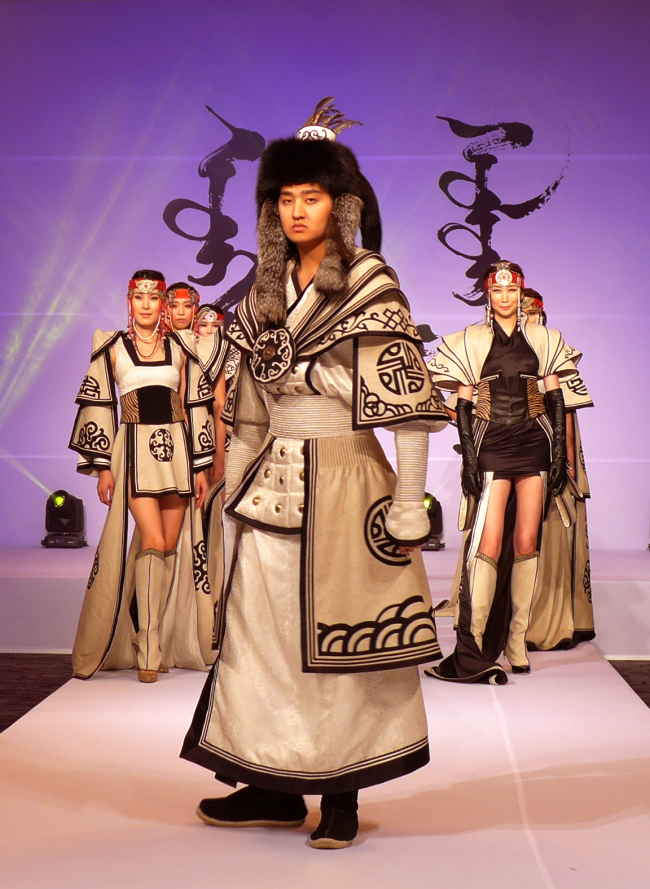While it might seem like a fashion show, the venue is actually a diplomatic reception marking the silver jubilee of ties between Mongolia and Korea.
“I have never seen anything like this for the last two years as an ambassador. It was extraordinary,” Azerbaijani Ambassador Ramzi Teymurov said at the event at Lotte Hotel in Seoul on Wednesday.
Bulgarian Ambassador Petar Andonov said, “The show was amazing. I felt touched by the beauty of Mongolian culture, choreography and models.”
Mongolia, wedged between China and Russia, entered the world economy in the early 1990s after four decades under socialism. It now has a fledgling democracy sitting on a treasure trove of gold, coal, copper and uranium, which feeds the country’s growth.
The country of nomads has now well and truly jumped on the bandwagon of globalization. A new middle class with Western tastes is emerging and people are well-traveled and educated. World-famous luxury brands can also be found in its capital Ulan Bator.
 |
| Models pose at a fashion show as part of the silver jubilee reception between Mongolia and Korea at Lotte Hotel in Seoul on Wednesday. (Joel Lee/The Korea Herald) |
Mongolian Ambassador Baasanjav Ganbold told The Korea Herald about his country’s multifaceted culture, which combines nomadic and urban elements.
“Our embassy wanted to showcase the beauty of our nomadic heritage in a contemporary tapestry. By weaving fashion, music and dance together, the show presented powerful snapshots of our past, present and future,” Ganbold said, while referring to the work of Mongolian designers Damdin Onobolar and Javhlangiin Tselmeg.
Mongolia’s experience of socialism had more freedom than that of China or North Korea, as the nomadic life required free movement across the land. The socialist legacy, rather than being eradicated, has been combined with market elements to create new identities, he said.
Korea is a gateway to the league of developed nations for Mongolia, Ganbold said. Bilateral trade volume has increased 140-fold since tying the diplomatic knot, making Korea Mongolia’s fourth-largest trading and investment partner.
A total of 1 percent of the Mongolian population ― 25,000 people ― currently live in Korea and over 4,000 Mongolian students study here.
“Modern Mongolian and Korean cultures are highly complementary, due to our intertwined history and heritage,” the ambassador noted. “With over 100,000 people exchanging visits every year, the growing social interaction is a firm pillar of our partnership.”
Ganbold said Mongolia needs more students studying science, engineering, medicine, information technology and agriculture. While Mongolia has livestock-based agriculture, it wants to learn from Korea’s advanced agricultural science and business models to upgrade its industry, he said.
“People have to do practical work to lift the economy to Korea’s level. The country needs more applied science majors than social science majors,” Ganbold said.
The ambassador highlighted the two governments’ commitment to the Korean Peninsula Trust Process and Eurasia Initiative, in regards to Korea’s contribution to regional peace and stability,
Vice Foreign Minister Cho Tae-yul said in a speech that Mongolia and Korea closely cooperate on regional initiatives, such as the Northeast Asia Peace and Cooperation Initiative and the Ulaanbaatar Dialogue on the Northeast Asian Security.
The Mongolian government has initiated some 30 infrastructure and social development projects totaling nearly $100 billion through public-private partnership deals.
Korean companies have an opportunity to contribute to Mongolia’s growth, such as in the Tavan Tolgoi coking coal mines project in southern Mongolia. Chinese and Japanese companies have been chosen to take part in the project through a public tender. But the opportunity for Korean comapnies lies in associated infrastructure work, according to the Mongolian embassy.
By Joel Lee (joel@heraldcorp.com)






0 comments:
Post a Comment